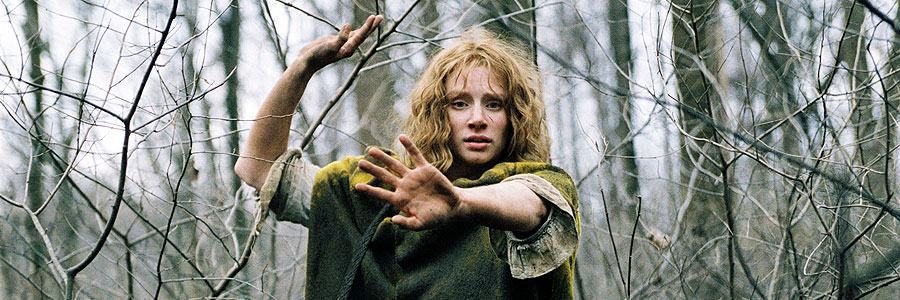
The Village
Blinding Edge Pictures
Original release: July 30, 2004
Running time: 108 minutes
Writer and director: M. Night Shyamalan
Composer: James Newton Howard
Cast: Bryce Dallas Howard, Joaquin Phoenix, Adrien Brody, William Hurt, Sigourney Weaver
I have an idea that I would like to talk to you about. 01:26:40 to 01:28:43
Deconstructing Cinema: One Scene At A Time, the complete series so far
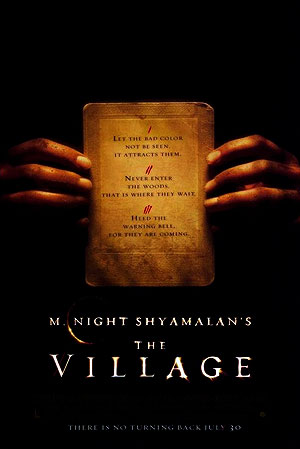
It’s the noise that gets to me most of the time… The ringing of the phones around me, the passing of planes and helicopters above my head, and the rattle of the train carriages as they flash past me, as well as the long rows of impatient drivers sitting in lanes of traffic as I stand waiting to cross the road… Everyone seems in a rush to get somewhere and everyone wants to be the first to get there, but where are they all going and why’s it so important? I can’t be the only one who’s ever dreamt of escaping it all and relocating to a place where those things didn’t exist and didn’t matter.
Whatever period we live in, there’s a tendency within us to look back on times past and say “it was so much better back then.” From our vantage point it always looks like yesterday was safer and simpler. Those were the times when people didn’t have to lock their doors. Children had respect for their elders. There wasn’t so much war going on. In truth we’ve always been like this; by nature it would appear we’ve always been in a rush to speed up our own demise, maybe that’s why we’re called “the human race”… But could we really ever break away and manufacture a version of reality to our own liking?
Following his success with The Sixth Sense (1999), Unbreakable (2000) and Signs (2002), writer and director M. Night Shyamalan sought to explore this idea with his next film, The Village, which was released in 2004. As with his other films, the story of The Village is one that’s rooted in mystery, especially where the outside world and what lies beyond is concerned, perhaps more so with this film.
It’s centered on a group of villagers who live far away and isolated from the rest of the world. Theirs is an existence unlike ours; there are no phones, no planes, no trains and no computers. In their world these things haven’t been invented yet, they live a very simple life in what seems like the end of the 19th century. Despite this idyllic setting the villagers are afraid of what lies beyond their boundaries. They keep guard at watch towers to make sure the monsters, whom they refer to as “Those We Don’t Speak Of”, don’t cross the lines that are marked by oil lanterns. They themselves don’t go beyond these lines. At the start of the film we witness the funeral of a seven-year-old boy, and shortly afterwards we learn of the skinned dead bodies of animals that have the villagers frightened.
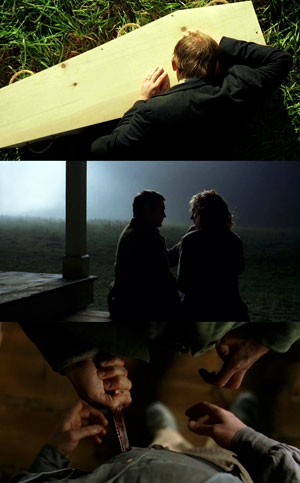
Lucius (Joaquin Phoenix), a quiet and well-meaning young man requests permission from the elders of the village, including his mother Alice (Sigourney Weaver), to leave the village and pass through the woods in order to get medical supplies from what he believes must be the neighbouring towns. His request is denied and he’s told that outside the village are “wicked places where wicked people live.” All is not what it seems though as we’re then shown that the elders of the village hold their own secrets in the form of little black boxes with contents they keep hidden from the younger members.
Ivy (Bryce Dallas Howard) is the blind daughter of the chief Elder, Edward (William Hurt), she’s in love with Lucius who remains determined to venture out beyond the village and return with those supplies. When they discover dim-witted Noah (Adrien Brody) has been leaving the village to pick red berries in the woods, Lucius becomes convinced that the monsters will let him pass and not see him as a threat, seeing as they didn’t harm Noah, seemingly due to his innocence. Alice, Edward and the rest of the elders eventually decide to grant him permission, this is decision is sped up by the fact that the monsters continue to terrorise the villagers by smearing red paint (“the bad color”) on their doors and leaving more skinned dead animals hanging in their doorways.
Unfortunately, before Lucius can set off, a terrible tragedy befalls him, thus leaving Ivy with no other choice but to make the journey herself. With everyone concerned that she’ll be easy prey for the monsters, being both a woman and blind, she knows it’s something she needs to do and with the blessing of her father, who gives her an item from “the shed not to be used”, she’s sent with two other boys from the village to gather medical supplies that will help save Lucius’ life. The boys end up deserting her, and Ivy’s forced to go the whole way on her own but by this time she already knows part of the secret the elders have been habouring about their lives there. The other part they’ll learn of together.
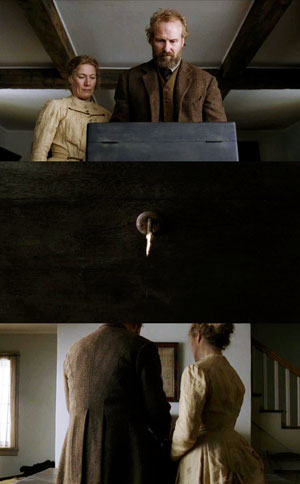
The Village, when I first saw it, was a film I found impossible not to fall in love with. Filled with mystery and suspense in a story that unfolds like many of my favourite childhood tales, it’s aided by exquisite cinematography, sublime music and beautiful performances by everyone in its cast, not least of all Bryce Dallas Howard as the innocent Ivy who, though blind, sees more than anyone else. Her power as a character comes from her ability to face her fears and step up to the challenges in a way that makes her a unique heroine.
Throughout the film we encounter moments of joy, sadness, horror and magic as we marvel at the wonder and tragedy of the human will to search for happiness at whatever cost. The moment we learn what the elders have hidden in their black boxes is one which symbolizes this tragedy best of all. It’s where we see Edward and Jayne (Tabitha Walker) opening their box to reveal what’s inside. We hear voice-overs as they gaze at the items within, relics from their past lives that tell us at once of the pains they gone through to shield themselves and their children from what they experienced in the “wicked places where wicked people live.”
MRS. CLACK:
My sister did not live passed her 23rd birthday. A group of men raped and killed her. They stuffed her in a dumpster three blocks from our apartment.
AUGUST NICHOLSON:
My brother worked in an emergency room downtown. A drug addict came in with a wound to his ribs. My brother tried to dress the wound. He pulled a gun from his jacket and he shot my brother through his left eye.
ALICE HUNT:
My husband, Michael, left for the supermarket at a quarter past 9 in the morning. He was found with no money and no clothes in the East River three days later.
EDWARD WALKER:
My father was shot by a business partner who then hanged himself in my father’s closet. They had argued over money. I am a professor. I teach American History at the University of Pennsylvania. I have an idea that I would like to talk to you about.
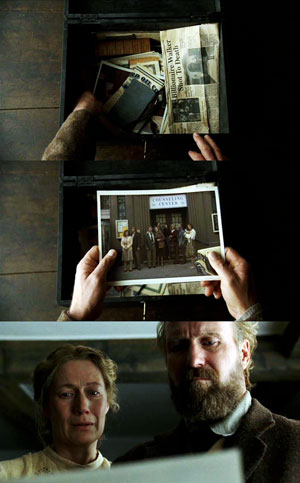
As each of the elders tell us what happened to them in their former lives, we start to understand the village as a social experiment and the implications of that shed light on our own chaotic modern lives as we eventually ask ourselves if such a thing could ever work, and why it might not.
It’s truly heartbreaking; despite all their efforts to keep the bad things out, we learn it’s actually something that resides in them, and in us all.
What a film like The Village also does on a subtler note is reflect on life in America after the September 11th attacks in 2001.
- [1] Charles Derry Dark Dreams 2. 0: A Psychological History of the Modern Horror Film from the 1950s to the 21st Century McFarland, 2009
- [2] Daniel L. Akin, David Paul Nelson, Peter R. Schemm A Theology for the Church B&H Publishing Group, 2007
- [3] Douglas M. Kellner Cinema Wars: Hollywood Film and Politics in the Bush-Cheney Era John Wiley & Sons, 2011
Given what Kellner says, together with wickedness arising from human nature and not the result of external forces, The Village emerges as a film that works on several levels, but one which was casually dismissed by “critics” and movie audiences and not helped by an ending devised to make us ask questions rather than giving us the answers.
While I’ve always wondered what it might be like to escape our current reality for something a little quieter, I’ve come to realise that it might not be as simple as that. Who’s to say that without technology, money and weapons we’d be ok, that we’d be able to evolve into an intelligent and compassionate species? We’d like to, but what’s stopping us?
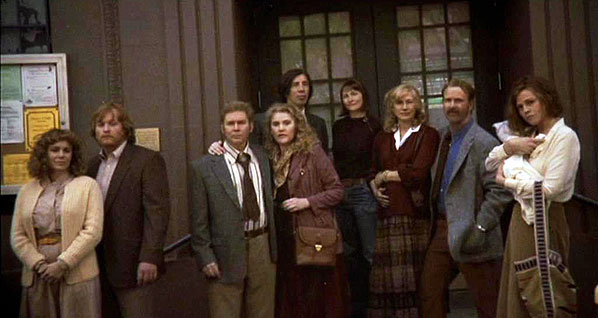

Patrick Samuel
The founder of Static Mass Emporium and one of its Editors in Chief is an emerging artist with a philosophy degree, working primarily with pastels and graphite pencils, but he also enjoys experimenting with water colours, acrylics, glass and oil paints.
Being on the autistic spectrum with Asperger’s Syndrome, he is stimulated by bold, contrasting colours, intricate details, multiple textures, and varying shades of light and dark. Patrick's work extends to sound and video, and when not drawing or painting, he can be found working on projects he shares online with his followers.
Patrick returned to drawing and painting after a prolonged break in December 2016 as part of his daily art therapy, and is now making the transition to being a full-time artist. As a spokesperson for autism awareness, he also gives talks and presentations on the benefits of creative therapy.
Static Mass is where he lives his passion for film and writing about it. A fan of film classics, documentaries and science fiction, Patrick prefers films with an impeccable way of storytelling that reflect on the human condition.
© 2022 STATIC MASS EMPORIUM . All Rights Reserved. Powered by METATEMPUS | creative.timeless.personal. | DISCLAIMER, TERMS & CONDITIONS
HOME | ABOUT | CONTACT | TWITTER | GOOGLE+ | FACEBOOK | TUMBLR | YOUTUBE | RSS FEED
CINEMA REVIEWS | BLU-RAY & DVD | THE EMPORIUM | DOCUMENTARIES | WORLD CINEMA | CULT MOVIES | INDIAN CINEMA | EARLY CINEMA
MOVIE CLASSICS | DECONSTRUCTING CINEMA | SOUNDTRACKS | INTERVIEWS | THE DIRECTOR’S CHAIR | JAPANESE CINEMA





